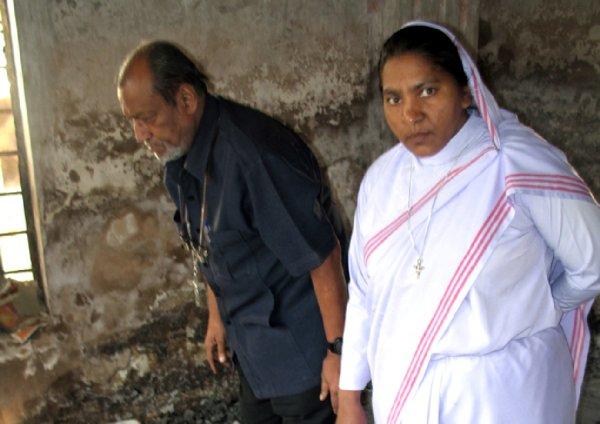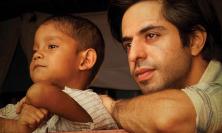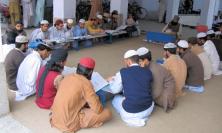The growing threat of persecution against Christians in Pakistan was made clear to the Pope at a recent meeting with the country’s bishops. As Pakistan celebrates its Independence Day, John Pontifex assesses the risks facing Christians and asks why the situation has suddenly got worse.
Pir Mahal is a rural town in Pakistan’s Punjab Province, about 300 miles south of Islamabad. One day last year, the police received reports that torn pages containing verses of the Qur’an had been dumped at a rubbish site. There were calls for arrests to be made among the town’s small Christian community. The police might have ignored the complaints had it not been for an announcement made a little while later in the local mosque. A priest in Pakistan described what happened next: “The news spread like wild-fire. The whole Christian community came under siege.” On this occasion the attack did not escalate into physical aggression, but there were repeated threats of violence, along with denouncements in the mosque and on the streets, and calls for Christians to convert to Islam or face the consequences. “Telephone calls had to be made in all directions. Anybody in a position to help had to cancel his or her schedule and give this emergency attention. The bishop had to rush to the spot and meet officials in the hope of bringing about some calm.” Soon there were threats of protests in other cities. The tension continued and, with no sign of a break-through in the inquiry, Christians were bunkered down in their homes, too afraid to go to work even though they were dependent on a daily wage.
Fortunately, on this occasion calm was eventually restored but increasingly such situations are not resolved so amicably. The risk of violence remained then, and still remains now for the Christian community of Pir Mahal. They live in a heightened state of alarm, their anxiety grounded in, among other things, an incident in 2004 in which a Christian man was accused, almost certainly without any evidence, of stealing a water pump from a Muslim leader. He was beaten so severely upon entering the town that he could not even answer the charges brought against him when he was taken to the police. He died from his injuries ten days later. The desperate worry that a situation like this may arise again has cast a permanent shadow over the security of the Christian community. They live in a perpetual state of fear, grounded in the reality of incidents such as this. In his report, the Pakistani priest-correspondent wrote: “It is hard to calculate the loss and one never knows how long the threat continues but the tension is so evident that you can almost slice the air in two with a knife.”
Over the past few years, bishops and other religious leaders have detected a rise in acts of violence as well as intimidation. The total Christian population in Pakistan numbers as many as 2.5 million but in a population of 160 million and with increasing reports of Christian emigration, the faithful feel more and more under siege. Reflecting those concerns, Archbishop Lawrence Saldanha of Lahore, pulled no punches when he addressed Pope Benedict XVI at last June’s five-yearly Ad Limina meeting in Rome. Speaking as president of the Pakistan Catholic Bishops’ Conference, he was reported as saying that the situation had dramatically declined within the past few years. No longer was the Church respected, not least for its work in education and medicine. Instead: “Today we carry out our mission in a hostile and conservative Islamic milieu that is increasingly extremist, intolerant and militant.”
How times have changed since that not-so-distant day in August 1947 when Mohammed Ali Jinnah declared the creation of Pakistan and spoke of the fledgling country as being a “home for Muslims” rather than an Islamic state, a nation in which religious freedom was a founding principle of government and society.
Politics in Pakistan have scarcely been anything other than volatile, with successive rulers wanting to make their own mark and bring about radical change. And yet, the Islamising agenda of Muhammad Zia ul-Huq in the 1970s and 1980s, remains intact despite the reforming zeal of more recent regimes, not least that of President Pervez Musharraf. Nowhere more so than in the Blasphemy Laws: under codes 295B and 295C of the Pakistan Penal Code, introduced in 1982 and 1986 respectively, defilement of the Qu’ran and acts of disrespect towards the prophet Mohammed are offences punishable by imprisonment and even death. The Blasphemy Laws institutionalised suspicion and even loathing towards non-Muslims in Pakistan and were to become a seminal moment in the decline of civil liberties for minorities.
What seems to have made the Blasphemy Laws such a threat is that, in the intervening years, antagonism against non-Muslims, especially Christians has mushroomed. It has been sponsored by extremist groups and spread through an ever-expanding network of madrassas (Islamic schools). And what bishops such as Lawrence Saldanha are noticing is that the threats made against Christians are no longer just verbal – vague utterances made in defence of Islamic ideals. Rather, the threats have become specific, targeted and, increasingly physical. In May 2007 Archbishop Saldanha gave an interview to the Catholic charity Aid to the Church in Need, saying that extremist Muslims across the country were now trying to force Christians to convert by threatening violence. He said 500 Christians in north-west Pakistan had recently received anonymous letters warning them that they would be killed and their churches closed if they failed to become Muslims within 10 days. Archbishop Saldanha said: “It distresses us that Christians are threatened in an attempt to force them to convert to Islam. This is something that has never happened before.”
The build-up of anti-Christian sentiment was something I would see for myself when I was asked to visit Pakistan with Aid to the Church in Need. Travelling to almost every diocese across the country, the aim was to investigate the underlying problems facing the Christian community and to ask what could be done to help. The timing of the visit – in spring 2006 – was in many ways inopportune. It came at the height of protests against cartoons of the Prophet Mohammed, originally published in Denmark. Within days of our arrival in the southern coastal city of Karachi, it became clear that I was witnessing first-hand a Christian community under siege. Further north, in the city of Lahore, the 100-year-old Sacred Heart Cathedral narrowly escaped being ransacked when tens of thousands of people gathered outside. A few days later, two churches in the town of Sukkur, in the south-east Sindh Province, were attacked and reduced to burnt-out shells.
The attacks made clear the perceived link between Christianity and the West, a byword in the eyes of many Muslims for decadence, ungodliness and unwarranted interference. It was no coincidence that when we visited Lahore a few days after the threatened attack on the cathedral, the mob had eventually vented their fury on a nearby parade of shops, restaurants and other businesses, many of which were US or European. Similarly, on more than one occasion when passing through a village or town, I was told to say that if asked my nationality I should avoid saying I was British.
But more pervasive than the physical trail of destruction left by the aggressors was the psychological impact of a growing phobia against supposedly un-Islamic influences. Undoubtedly one of the most moving and powerful experiences of the entire three-week trip was an exclusive interview with Yusuf Said, the man at the centre of one of the most vicious outbreaks of violence against Christians in recent years. Yusuf, a former buffalo trader, had been charged with defiling the Qur’an, a crime he almost certainly did not commit. The allegation had been sparked by a bet at the conclusion of which Yusuf had refused to hand over any money. Within a few hours, Yusuf was accused of desecrating the Qur’an. The local imam broadcast Yusuf’s alleged crime to all the faithful and within a few hours the Christian quarter of the town was besieged. Muslim extremists were reportedly bussed in from neighbouring towns and villages to cause maximum disturbance. When the Muslim extremists eventually cornered Yusuf, he was hauled through the courts. He was found guilty of defiling the Qur’an but when the main prosecution witness admitted to giving false evidence, Yusuf’s conviction was over-turned. In an interview with me a shortly after his release from custody, an emotional Yusuf told his story. Speaking through an interpreter, he explained that he had been physically abused in a bid to extract a confession from of him. He said: “The police tied a rope through my legs and hung me from the ceiling. I was handcuffed. They told me to admit my guilt or reveal the culprit. They beat me with a slipper the length of my arm. For 14 days they kept me in police stations, moving from one to another no less than four times.”
And even though he had been proved innocent, he was not a free man. Still separated from his wife and children, Yusuf was being held in a safe-house provided by the bishops. Muslim extremists disputed the appeal finding and were bent on revenge. In the end, the Church that was sheltering him had no option but to appeal for him to be given asylum in the West. Eventually he was accepted into Europe.
For Yusuf, the problems he faced in Pakistan may be a thing of the past, but for the Christian community he left behind, his tragic case demonstrates how perilous their situation now is. Even proven innocence does not guarantee them fair treatment. And nor have political developments helped matters. Former Prime Minister Benazir Bhutto, much criticised though she was, had good relations with Church leaders. They recognised that her openness to the West signalled a willingness to work for greater plurality in Pakistan. In interviews with Aid to the Church in Need, given shortly after her death last December, Pakistani Church leaders said they had more than most to lose by her death. Even without Bhutto, central government under Pervez Musharraf always provided some form of buffer against the rise of extremism, for example promising extra security for churches in the wake of the 2006 prophet Mohammed cartoon riots. But now, the decline of central government is causing Church leaders even more alarm. Who will protect them from extremist groups whose political and cultural influence seems to grow by the day? The bishops will be watching with alarm both the decline of President Musharraf’s powerbase, not least the threat of impeachment, and the break-up of the cabinet made up of Benazir Bhutto’s Pakistan Peoples’ Party, now led by her husband Azif Ali Zardari, and the PML-N party, run by her old adversary, Nawar Sharif.
So what – if any – hope is there for the Church in Pakistan? Increasingly destabilised, the Church has huge difficulties fighting its own corner. Not least among the problems is that more than 80 percent of Christians in Pakistan are from very poor, rural parts of the country, where the main form of employment for many is to work as bonded labour in fields and factories. Their standard of living is very low and many of them lack birth certificates and are denied a vote or healthcare. Victimisation by mercenary land-owners is all too easy.
But there are positive signs. There are at least six seminaries in Pakistan; despite all the difficulties many of the schools nationalised under Zia ul-Huq have been returned to their original owners, which in many cases, means the Church. Advocacy teams under a well organised Justice and Peace Commission, are successfully fighting the cases of many Christians falsely accused under the Blasphemy Laws. As a charity for persecuted and other suffering Christians, Aid to the Church in Need (ACN) is constantly asked to lend assistance for help with projects, many of which involve new catechisms, Child’s Bibles and help with seminary formation. And while evangelisation is impossible in a hard-line Muslim environment, there are pockets of the country where outreach is possible. In June, staff from ACN met up with Bishop Max Rodrigues of Hyderabad, who highlighted the growth of evangelisation programmes among tribal communities deep in the country in his diocese in Sindh province. In a heart-felt tribute to the success of the missions, he said: “The task of evangelisation in a theocratic country, strongly Islamised… is a difficult thing but in my diocese there is a large tribal apostolate.” He said it was revolutionising attitudes to women and encouraging people to take education more seriously.
But for such activities to succeed in over-turning a tide of intolerance and ignorance, the severity of the problems needs to be recognised in the West. The long-term future of the Church in Pakistan is far from secure. Current events are begging ever more searching questions about how to step up efforts to support the faithful there. In his reports about the disturbances in Pir Mahal, the priest writing to ACN from Pakistan concluded: “The point I am making is that these [acts of persecution] are social disasters for the community and there are very few agencies at work fighting these evils.”
John Pontifex is UK Head of Press and Information for Aid to the Church in Need.
For information about Aid to the Church in Need, visit www.acnuk.org or contact Aid to the Church in Need, 12-14 Benhill Avenue, Sutton, Surrey SM1 4DA. Tel. 020 8642 8668.
Aid to the Church in Need (UK) Registered with the Charity Commission. No.1097984





